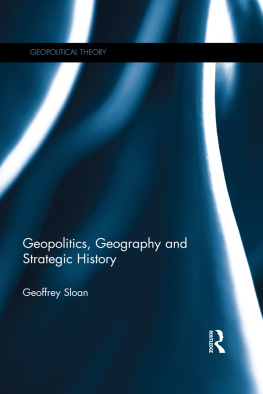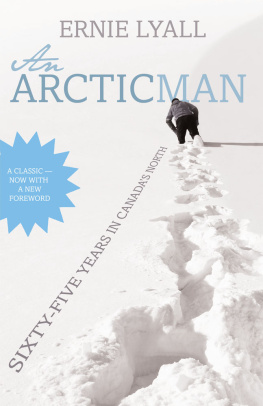ENCOUNTERING THE NORTH
Encountering the North
Cultural Geography, International Relations and Northern Landscapes
Edited by
FRANK MLLER and SAMU PEHKONEN
Tampere Peace Research Institute,
University of Tampere, Finland
First published 2003 by Ashgate Publishing
Reissued 2018 by Routledge
2 Park Square, Milton Park, Abingdon, Oxon OX14 4RN
711 Third Avenue, New York, NY 10017, USA
Routledge is an imprint of the Taylor & Francis Group, an informa business
Copyright Frank Mller and Samu Pehkonen 2003
Frank Mller and Samu Pehkonen have asserted their right under the Copyright, Designs and Patents Act, 1988, to be identified as editors of this work.
All rights reserved. No part of this book may be reprinted or reproduced or utilised in any form or by any electronic, mechanical, or other means, now known or hereafter invented, including photocopying and recording, or in any information storage or retrieval system, without permission in writing from the publishers.
Notice:
Product or corporate names may be trademarks or registered trademarks, and are used only for identification and explanation without intent to infringe.
Publishers Note
The publisher has gone to great lengths to ensure the quality of this reprint but points out that some imperfections in the original copies may be apparent.
Disclaimer
The publisher has made every effort to trace copyright holders and welcomes correspondence from those they have been unable to contact.
A Library of Congress record exists under LC control number: 2002043965
ISBN 13: 978-1-138-72250-7 (hbk)
ISBN 13: 978-1-315-19350-2 (ebk)
Contents
Frank Mller and Samu Pehkonen
Ari Aukusti Lehtinen
Frank Mller
Paulo Susiluoto
Juha Ridanp
Hanna-Mari Ikonen and Samu Pehkonen
Ulrich Albrecht
Jochen Hille
Monica Tennberg
Leena Suopajrvi
Pertti Joenniemi
Ulrich Albrecht is Professor of Political Science and Peace Research at Free University Berlin, Germany.
Jochen Hille is Ph.D. candidate at Humboldt University Berlin, Germany.
Hanna-Mari Ikonen is Researcher in the Department of Regional Studies and Environmental Policy at the University of Tampere, Finland.
Pertti Joenniemi is Senior Research Fellow at Copenhagen Peace Research Institute, Denmark.
Ari Aukusti Lehtinen is Professor of Geography at the University of Joensuu, Finland.
Frank Mller is Research Fellow at Tampere Peace Research Institute, Finland.
Samu Pehkonen is Research Fellow at Tampere Peace Research Institute, Finland.
Juha Ridanp is Lecturer in the Department of Geography at the University of Oulu, Finland.
Leena Suopajarvi is Lecturer in the Department of Social Sciences at the University of Lapland in Rovaniemi, Finland.
Paulo Susiluoto is Researcher at the Finnish Forest Research Institute in Kolari, Finland.
Monica Tennberg is Researcher in the Department of Social Science at the University of Lapland in Rovaniemi, Finland.
We are indebted to Tampere Peace Research Institute (TAPRI) for financial and logistic support of the project which resulted in the present volume. Furthermore, TAPRI hosted, in December 2001, an international workshop on Cultural Geography, International Relations and Northern Landscapes, at which occasion the articles commissioned for the book were first presented and discussed. We are in particular grateful to the former and current Research Directors, Tuomo Melasuo and Tarja Vyrynen, for unconditionally supporting the project.
Permission to reproduce maps and plates here is gratefully acknowledged from the following:
The Geographical Society of Finland;
Kenneth Mikko and N66/Culture in the Barents Region;
Uppsala University Library;
Stortingsarkivet and Teigen Fotoatelier;
Muse de lHomme, Paris;
Department of Musical Anthropology, University of Tampere; and
Jorma Puranen.
Our special thanks go to Roland Caldbeck for editing the language of most of the chapters, to Anitta Kynsilehto for putting together the index, to Tarja Hyrks for copy-editing and to Anja Reini for organizational help. We are also grateful to the editorial staff at Ashgate, in particular Valerie Rose, Sarah Horsley, Rachel Keane and Adrian Shanks, and the anonymous referees of our initial proposal.
Most importantly we would like to thank the authors for their free-flowing creativity and generous willingness to share their ideas with us, for delivering their chapters within the given time limit, for their open-minded response to our comments and suggestions and for their enthusiastic participation in the whole project.
Frank Mller and Samu Pehkonen1
This volume is concerned with the European North above the polar circle and its representations in Cultural Geography and International Relations. The chapters in the book deal with cultural, geographical and political imaginations of Northern peoples and landscapes. These imaginations are not treated independently of one another. Rather, emphasis is put on the triangle of and interrelationship between culture, geography and politics. It is aspired to make self-imposed, thought-paralyzing academic boundaries permeable and to replace mutual neglect with open-mindedness and cognitive curiosity.
Yet, a synthesis of Cultural Geography and International Relations is not intended. Likewise, we are not interested in a binding definition of the North, i.e. a precise statement of its essential culture and nature, which we consider neither possible nor desirable. The simple working definition which we have suggested in the first sentence of the chapter, on the one hand, reflects a standard approach to the North which is as arbitrary as any other approach. On the other hand, it suggests, by its seductive simplicity, to ignore its inherent geographical limitation and to think beyond it. Pretending to know the real meaning of a region inevitably means reducing complexity rather than working with it. Indeed, definitions of regions always mean territorial limitations, and territorial limitations tend to result in cognitive restrictions. Inquiries into and academic obsession with the limits of the North, rather than its content, exemplify this limitation.2
Regions do not exist in isolation. Geographical or political mapping of a particular region, clearly distinct from neighbouring regions, is bound to fail when one is interested in the social world. Regions, however defined, and adjacent areas shape each other. People gain information from beyond their own immediate area and incorporate this into their view on both their own locality and beyond. As Yosef Lapid has argued with respect to culture, the challenge is not to push energetically to some consensual but arbitrary reduction, but to reflectively match suitable definitional assets to declared theoretical missions.3 The same may be said with respect to the North. For this reason, the geographical definition introduced above is treated rather generously by some of the authors in this volume in accordance with their theoretical mission. Indeed, as Raymond Williams has emphasized, complexity is not to be found in a particular word, but rather in the problems which its variations of use significantly indicate.4 The historical and contemporary variations of meaning assigned to the North point to real processes which have to be studied in their own terms. To meet this goal, our approach to the discursive landscapes of the North does not plainly denote the sites and levels of discourses (be they academic, political or popular) but it takes into account the material circumstances making the context of the European North.5







